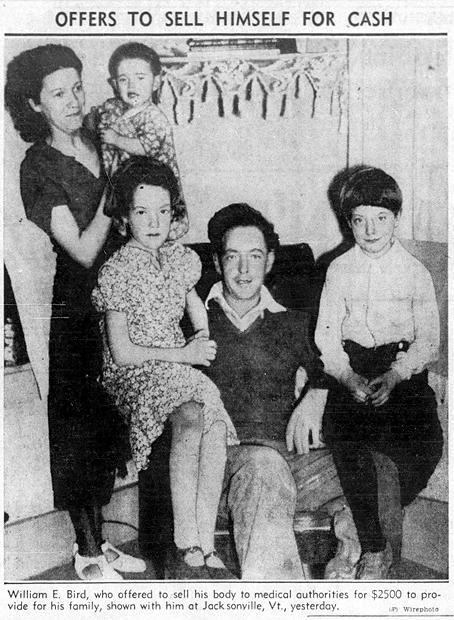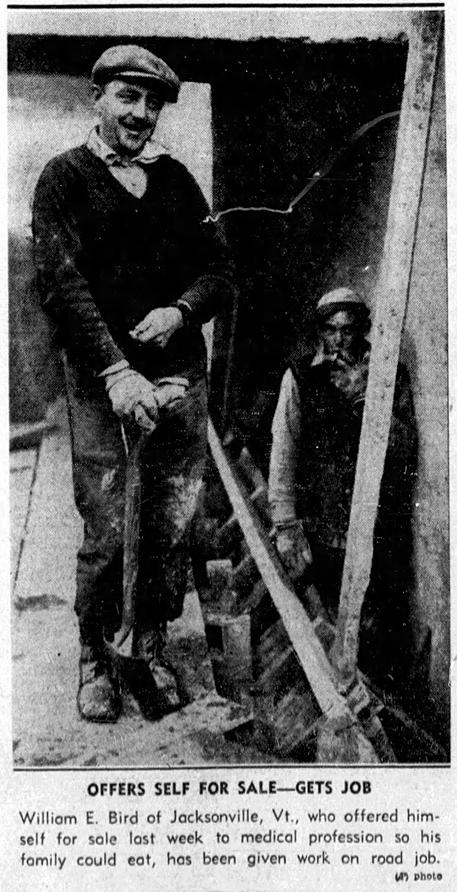The Man Who Wanted to Sell Himself to Science
Like a lot of people during the great depression, William Bird of Jacksonville, Vermont had fallen on hard times. He was out of work, heavily in debt, and facing eviction. He feared he would soon be unable to feed his wife and three children. So Bird came up with a plan. He would sell himself to science.

He announced his offer in November 1936 by sending a letter to the local press. It read, in part:
Soon he sweetened the offer by specifying that it would be all right with him if he didn't survive the experimentation process. Naturally, his wife was opposed to the whole idea.
The media spread his unusual offer nationwide. Reporters noted that he was a prime physical specimen — six feet tall, 175 pounds, and a sturdy workman of good habits. In other words, excellent guinea pig material.
An anonymous Texan took sympathy on Bird and sent him $10. However, the scientific community wasn't tempted. No doctors took him up on his offer.
Although Bird didn't manage to sell himself as a human guinea pig, his story nevertheless had a happy ending. Within days of making his appeal, Bird was given a job on a construction project. He said, "I don't know who was responsible for giving me work, but I sure appreciate it." But he also noted that, despite now having a job, his offer still stood. He was still willing to sell himself to science, should some doctor ever want to take him up on it.


Los Angeles Times - Nov 15, 1936
He announced his offer in November 1936 by sending a letter to the local press. It read, in part:
I’m sick and tired of being in debt and without a job. Everything seems to have failed. There’s no work to speak of. I’m in debt $400. Food is running low. The fire in our kitchen stove is going out. My wife and three children need clothes to keep them warm during the winter. I’ve got to keep them together. There seems to be only one hope. I’d like to sell myself for $2500…
If there is some doctor or group of doctors or scientists who’ll advance me $2500, I’ll agree to pay it back in two years. I have to sort of sell or mortgage myself because that’s the only security I can put up.
Now, if I failed to pay back the money when the time was up, I’d let them do anything they want with me. I’d let them try and kind of experiment on me.
If there is some doctor or group of doctors or scientists who’ll advance me $2500, I’ll agree to pay it back in two years. I have to sort of sell or mortgage myself because that’s the only security I can put up.
Now, if I failed to pay back the money when the time was up, I’d let them do anything they want with me. I’d let them try and kind of experiment on me.
Soon he sweetened the offer by specifying that it would be all right with him if he didn't survive the experimentation process. Naturally, his wife was opposed to the whole idea.
The media spread his unusual offer nationwide. Reporters noted that he was a prime physical specimen — six feet tall, 175 pounds, and a sturdy workman of good habits. In other words, excellent guinea pig material.
An anonymous Texan took sympathy on Bird and sent him $10. However, the scientific community wasn't tempted. No doctors took him up on his offer.
Although Bird didn't manage to sell himself as a human guinea pig, his story nevertheless had a happy ending. Within days of making his appeal, Bird was given a job on a construction project. He said, "I don't know who was responsible for giving me work, but I sure appreciate it." But he also noted that, despite now having a job, his offer still stood. He was still willing to sell himself to science, should some doctor ever want to take him up on it.

Los Angeles Times - Nov 18, 1936
Comments
". . . I'd let them do anything they want with me." If a woman said that, they'd have arrested her for prostitution.
Posted by Phideaux on 09/09/19 at 04:20 PM
If we look in the Bible, we see that his owner would have had only a six year period to experiment with him; on the seventh year, everybody who sold themselves as slaves have to be set free.
Posted by Yudith on 09/10/19 at 05:18 PM
Commenting is not available in this channel entry.

Category: Science | Experiments | 1930s